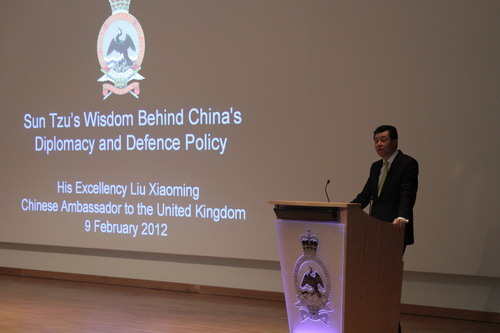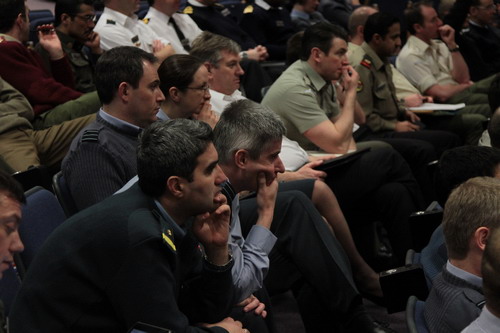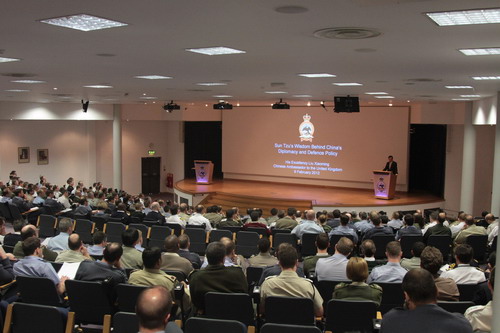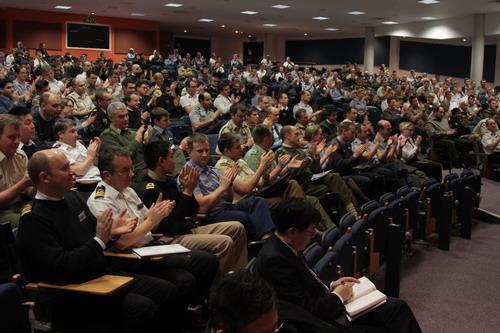|

Air Vice-Marshal Ray Lock,
Ladies and Gentlemen,
Commanders of the Future,
It’s my great pleasure to visit the Joint Services Command and Staff College.
I was delighted to accept the invitation of Air Vice-Marshal Ray Lock to give this talk.
I’ve visited and spoken at many British universities, such as Oxford, Cambridge and Imperial College. But today is unique in the sense that this is my first speech to a military college.
I am impressed to know that your College has won a reputation as the cradle of military leaders for Britain.
I feel privileged to speak and propose to touch on three themes:
· China’s diplomacy;
· China’s defence policy;
· And China’s relations with Britain and Europe.
We need to take a step back to understand China’s foreign and defence policy. Since this is a military college, let’s trace the origin of Chinese thinking on war and peace.
The key is an ancient Chinese book.
Sometime it is called ‘Military Principles’ but the more popular translation is The Art of War.
This is a classical Chinese military treatise written 2,500 years ago. The book was authored by a high-ranking general called Sun Tzu.
The book has since been translated into many languages and read and studied around the world. It is said there are 17 English versions.
You might ask what relevance such an ancient book has in the high technology world of today. Some arguments in The Art of War do seem to be out of touch in the modern world.
But with careful study you will find that many of its strategies, tactics and thoughts are highly relevant today. The book still offers a central text of military thought for defense communities. I know that the book has been adopted as a must-read by West Point and many other military academies.
The prominent British military historian and theorist Sir Basil Liddell Hart was a student of The Art of War. He argued the book was far from outdated.
In his foreword for Samuel Griffith’s English translation of the book, he wrote:
“It was time they went back to Sun Tzu, since in that one short book was embodied almost as much about the fundamentals of strategy and tactics as I had covered in more than twenty books.”
For China, the importance of The Art of War has spread far beyond military studies. The book has deep influence in framing China’s foreign policy and its approach to security and defence.
The opening line of The Art of War is:
“The art of war is of vital importance to the State. It is a matter of life and death, a road either to safety or to ruin.
Hence it is a subject of inquiry, which can on no account be neglected.”
Sun Tzu continued:
“Thus the highest form of generalship is to balk the enemy’s plan. The next best is to prevent the junction of the enemy’s forces. The next in order is to attack the enemy’s army in the field. And the worst policy of all is to besiege walled cities.”
The Art of War stands out from other military theory books. The reason is the stress on the cautious use of force and to avoid war.
Sun Tzu is not alone in this view.
Many Chinese philosophers around his time also cautioned against war. Both Lao Tzu and Mencius warned war and conflict carry big dangers.
There have also been thinkers outside China that support this approach. The famous British philosopher, Bertrand Russell, also observed the consistent commitment to peace of China. 90 years ago Russell wrote in his book The Problem of China that:
“Although there have been many wars in China, the natural outlook of the Chinese is very pacifistic.”

This legacy explains China’s choice of a peaceful path to development today. These are the key facts about our foreign and defence policies:
· China’s commitment to an independent, peaceful foreign policy is based upon its national conditions. This reflects the needs of our time.
· At the heart of our policy is to build a peaceful world that provides shared prosperity for all.
· China calls for mutual trust, mutual benefit, equality and cooperation to build a peaceful world.
· China actively assumes its fair share of global responsibilities and seeks to shape a friendly neighborhood.
· We want to work with all countries and contribute to a harmonious world of lasting peace and common prosperity.
· China does not believe in expansion or hegemony.
· Instead, we have always been a staunch force for world peace and regional stability.
· China will not repeat the errors of history, whereby ‘power leads to hegemony’. That approach has plunged the world into disaster and conflict.
· China supports the centrality of the United Nations in matters affecting world peace and security.
· China is committed to addressing international disputes and related crisis in a peaceful manner.
· China is the only country that has publicly undertaken not to be the first to use nuclear weapons. In addition China will not use, or threaten to use, nuclear weapons against non-nuclear countries or nuclear-free zones.
· China is the largest peace keeping contributor within the UN Security Council. We have sent 21,000 peacekeepers on 30 UN missions.
· China plays an active role in international counter-terrorism and non-proliferation. Currently, our naval vessels are performing escort missions in the waters off Somalia.
· China encourages peace talks on the North Korean nuclear issue. We are the host and a constructive participant in the Six-Party talks.
· The same approach applies to the Iranian nuclear issue and other critical conflicts.
· China has peacefully addressed its long-standing boundary issues with 12 of its neighbours on land. We are determined to find negotiated solutions to territorial and maritime disputes with neighbouring countries
· China is guided by the principle of ‘shelving disputes and joint development’. We will do everything we can to keep the South China Sea, the East China Sea and our entire neighborhood peaceful and stable.
Recently, I spoke about the peaceful, responsible role of China in world affairs. This was on BBC Newsnight. Jeremy Paxman asked me:
“The United States will go to war to promote democracy, what do you try to promote?”
I responded by saying:
“We are promoting a harmonious world. We believe the world will be more peaceful and prosperous, if all countries respect each other, rather than imposing their own ideas and systems onto others. We believe mutual respect, mutual accommodation and working together for the common good, common security is in the interest of peace and stability of the world. So we are strongly opposed to any military solutions.”
This is what China’s peaceful foreign policy is all about.

Consistent with this foreign policy guideline, China’s military posture is defensive in nature.
Let me explain our thinking by returning to The Art of War and ask this question:
If war is an art, then what is the highest level of victory?
Sun Tzu gives this answer:
“To fight and conquer in all your battles is not supreme excellence; supreme excellence consists in breaking the enemy’s resistance without fighting.”
To stress the war as the last resort for self-protection, Sun Tzu continues:
“Fight not unless the position is critical”.
Essentially Sun Tzu laid out a strategy of pro-active defence where he writes:
“The art of war teaches us to rely not on the likelihood of the enemy’s not coming, but on our own readiness to receive him; not on the chance of his not attacking, but rather on the fact that we have made our position unassailable.”
Only a strong and credible force of defence can effectively protect national sovereignty and development interests.
Only such a force can effectively deter any attempt for war. This is what the pattern of world history has taught us.
China has a huge landmass and vast waters under its jurisdiction.
We face a complex international strategic landscape and security environment. In addition a new revolution in military affairs is gaining momentum worldwide.
Going forward, the critical challenges for China are three-fold:
· Whether or not China can defeat diverse and complex non-conventional security challenges?
· Whether or not China can effectively deal with threats from violent terrorism, ethnic separatism and religious extremism?
· And whether or not China can win a high-tech war in the future?
The answers to these three questions determine whether China’s national rejuvenation is possible.
What I want to stress are these points:
· China’s defence modernisation doesn’t target or threaten any one.
· China has no interest or intention to engage in any arms race.
· China’s defence building never exceeds the need for national security.
· And China’s defence spending has always been reasonable and proportionate to the challenges we face.
These are key comparative facts about military spending:
· According to a report of the International Institute for Strategic Studies, China’s military budget is relatively low compared to other major powers.
· Our spending was only 1.3 percent of China’s GDP in 2010.
· This figure is below that of America, Britain, Russia.
· Also the 1.3 percent of GDP is lower than some emerging countries such as India and Brazil.
· At a per head level, China’s defence spending is even lower. We are only 1/38 of America and 1/20 of Britain.

In essence, The Art of War talks about avoiding war and going to war with caution. But, this prudent approach does not mean fear or cowardice.
It is crucial that leaders around the world understand our defence strategy. They should never mistake the principles of The Art of War as a display of weakness and vulnerability.
China is not to launch preemptive strikes. But in case we are threatened or under attack, there should be no doubt that China will take robust action to protect its interests.
The thrust of Chinese defence strategy is very clear. China has the deterrence and wisdom to win without fighting. But if needed, China has the courage and capability to win through fighting.
This is the essence of The Art of War and the soul of China’s military strategy today.
Ladies and Gentlemen,
I would also address the issue of China’s relations with Britain and Europe.
In today’s world, the China-Europe relationship carries much weight. China is the world’s largest developing country and Europe is by far the largest bloc of developed countries. We have no geopolitical tension or fundamental conflicting interests between us.
For decades, cooperation has been the defining feature of our relationship. Today, we are each other’s number one trading partner. To be specific, the EU is China’s largest export market, largest investment destination and the biggest technology supplier of China. And China is the EU’s second largest export market.
Turning to the relations between China and Britain.
China-UK relations are also growing fast. This is a partnership marked by mutual good-will, close high-level engagements, strong commercial ties and fast developing people-to-people exchanges.
This year, our two countries will co-host a range of celebrations to mark 40 years of full diplomatic relations.
In the context of this strengthening relationship, one particular area of good progress is our military-to-military ties.
Last year, Britain’s Chief of General Staff, Chief of Naval Staff and Chief of the Air Staff all paid visits to China.
China-UK defence strategic consultation and a structured dialogue between Chinese and British retired senior military officers have been put in place.

In this final part of my talk today I would like to pose the following question:
· Going forward, how to strengthen China’s relations with Britain and Europe?
Let me borrow some wisdom from The Art of War and China’s ancient sages.
The Art of War famously remarked:
“If you know your counterparts and know yourself, you will have nothing to fear.”
What merits much attention is that the book’s original Chinese text has 6,074 characters.
Within these characters the word ‘know’ appears 79 times. That is more than any other character.
Today, Europe and Britain are China’s partners, not adversaries. For our partnership to strengthen and widen, we need to know each other better. We need greater trust to disarm suspicions and concerns. Let me quote what one veteran British general said of China.
Lieutenant-General Sir Graeme Lamb is the former Commander Field Army. Last year he led a delegation of British veteran generals to China.
In The Times upon his return, he wrote these words:
“We should talk to China, not demonise it. … The danger lies in making a new enemy. …When it comes to relations with the Chinese, … it's good to talk. That applies to both sides. …Knowledge dispels fear.”
We Chinese have an old saying:
“Everything has its merits and demerits. And wisdom has its limits”.
The fact that China is at a different stage of development from Britain and Europe means we face different sets of challenges.
This also means we have much to gain from this strong economic complementarity and from cooperation.
Greater effort must be made to widen the scope of cooperation and to tap into the rich potentials to build a win-win future.
For this to happen, our different histories, cultures, social systems and values shouldn’t become barriers. The question is how we should handle differences and diversity.
Some people see their own system as universal and try to export it throughout the world. They see their own values as the only right standard, to which the whole world should be held up.
This is not what we would support. We are not in favour of imposing one’s own views on others, nor do we support Cold-War style ideological confrontation.
We believe in facing up to differences squarely, with respect and a shared commitment to seek common ground. Only in this way can we achieve win-win and both succeed through good-faith mutual learning.

Talking of solidarity and cooperation, there’s another well known story arising from The Art of War. The story is about Warring Kingdoms. The people from the Wu Kingdom and those from the Yue Kingdom did not like each other. But when paddling across the river during a storm, they would cooperate as the right hand does with the left.
From this story came a Chinese idiom:
‘Those sailing across the river in one boat should help each other.
In a multipolar world our society has become a global village. The driving forces of new technologies have shaped that globalisation.
In this globalised world collaboration is the only solution to shared challenges. Global challenges are with us daily, such as:
· Terrorism.
· WMD proliferation.
· Natural disasters.
· Climate change.
· Public health.
· Financial risks.
· Energy and resource scarcity.
· Food and water safety.
All these are challenges on a global scale and threaten all of us.
China and Europe are today interlinked and interdependent and have a shared destiny.
China and Europe must show solidarity and work together to achieve sustainable and inclusive development.
Ladies and Gentlemen,
China’s diplomacy and thinking on defence have deep roots in Chinese history. I have described how the ancient principles are highly relevant to the challenges of our time. China strengthens its approach by also absorbing the best ideas from other countries.
The Art of War certainly cannot capture all facets of China’s conduct of diplomacy and defence policy. But it’s my belief that this book provides a good beginning to understand Chinese thinking and culture.
I hope you will be inspired to study China more with the support of The Art of War. I believe if you follow this path you will grasp the value of China’s choice of peaceful development. This is also the road to dispel unfounded misgivings and add momentum for dialogue and cooperation.
As future military leaders from this prestigious college you have high responsibilities. As China rises, you will find my country more relevant within those responsibilities. So, I hope my thoughts today will inspire you to study China deeply.
In this way you can maximise the prospect of building a peaceful and harmonious world.
That is surely a shared goal of mutual interest for all our people.
Thank you!

|

